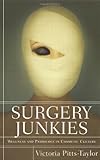Related eBooks
There are many tools you can use to help you decide on breast enhancement. One option to look at is video to see if the surgeon can do what you want.
Source:Can Video Help You To Decide On Breast Enhancement?
Related Reading:
 Surgery Junkies: Wellness and Pathology in Cosmetic CultureThe ease of accessibility, improvements in safety and technology, media attention, growing acceptance by the public, or an increasingly superficial culture: whatever the reason, cosmetic surgery is more popular today than ever. In 2005, in the United States alone, there were nearly two million aesthetic operations-more than quadruple the number from 1984, along with more than eight million non-surgical procedures. Innovative surgical methods have also brought cosmetic improvements to new areas of the body, such as the ribs, buttocks, and genitalia.
Surgery Junkies: Wellness and Pathology in Cosmetic CultureThe ease of accessibility, improvements in safety and technology, media attention, growing acceptance by the public, or an increasingly superficial culture: whatever the reason, cosmetic surgery is more popular today than ever. In 2005, in the United States alone, there were nearly two million aesthetic operations-more than quadruple the number from 1984, along with more than eight million non-surgical procedures. Innovative surgical methods have also brought cosmetic improvements to new areas of the body, such as the ribs, buttocks, and genitalia.Despite the increasing normalization of cosmetic surgery, however, there are still those who identify individuals who opt for bodily modifications as dupes of beauty culture, as being in conflict with feminist ideals, or as having some form of psychological weakness. In this ground-breaking book, Victoria Pitts-Taylor examines why we consider some cosmetic surgeries to be acceptable or even beneficial and others to be unacceptable and possibly harmful. Similarly, why are some patients considered to be psychologically healthy while others deemed pathological? When is the modification of our appearance empowering and when is it a sign of weakness?
Drawing on years of research, her personal experience with cosmetic surgery, analysis of newspaper articles and television shows, and in-depth interviews with surgeons, psychiatrists, lawyers, judges, and others, Pitts-Taylor brings new perspectives to the promotion of "extreme" makeovers on television, the medicalization of "surgery addiction," the moral and political interrogation that many patients face, and feminist debates on the topic.
While many feel that cosmetic surgery is a deeply personal choice and that its pathology is rooted in the individual psyche, Pitts-Taylor makes a compelling argument that the experience, meanings, and motivations for cosmetic surgery are highly social. A much needed "makeover" of our cultural understanding of cosmetic surgery, this book is both authoritative and thoroughly engaging.
 Flesh Wounds: The Culture of Cosmetic SurgeryWhen did cosmetic surgery become a common practice, the stuff of everyday conversation? In a work that combines a provocative ethnography of plastic surgery and a penetrating analysis of beauty and feminism, Virginia L. Blum searches out the social conditions and imperatives that have made ours a culture of cosmetic surgery. From diverse viewpoints, ranging from cosmetic surgery patient to feminist cultural critic, she looks into the realities and fantasies that have made physical malleability an essential part of our modern-day identity.
Flesh Wounds: The Culture of Cosmetic SurgeryWhen did cosmetic surgery become a common practice, the stuff of everyday conversation? In a work that combines a provocative ethnography of plastic surgery and a penetrating analysis of beauty and feminism, Virginia L. Blum searches out the social conditions and imperatives that have made ours a culture of cosmetic surgery. From diverse viewpoints, ranging from cosmetic surgery patient to feminist cultural critic, she looks into the realities and fantasies that have made physical malleability an essential part of our modern-day identity.For a cultural practice to develop such a tenacious grip, Blum argues, it must be fed from multiple directions: some pragmatic, including the profit motive of surgeons and the increasing need to appear young on the job; some philosophical, such as the notion that a new body is something you can buy or that appearance changes your life. Flesh Wounds is an inquiry into the ideas and practices that have forged such a culture. Tying the boom in cosmetic surgery to a culture-wide trend toward celebrity, Blum explores our growing compulsion to emulate what remain for most of us two-dimensional icons. Moving between personal experiences and observations, interviews with patients and surgeons, and readings of literature and cultural moments, her book reveals the ways in which the practice of cosmetic surgery captures the condition of identity in contemporary culture.
purple squirrel blade runner close encounters of the third kind norovirus beyonce and jay z baby droid 4 tom brady sister
No comments:
Post a Comment
Note: Only a member of this blog may post a comment.